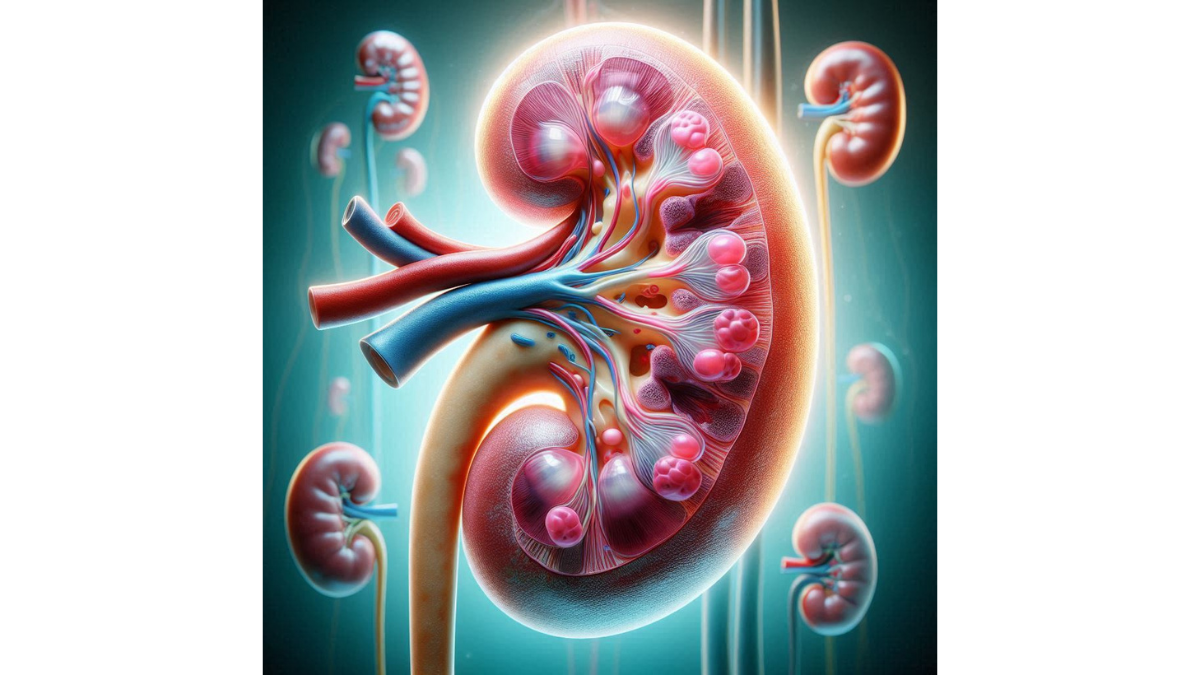Understanding the Different Types of Kidney Disease

Understanding the Different Types of Kidney Disease – The kidneys play an essential role in maintaining our overall health. Located at the back of the abdomen, these two bean-shaped organs are responsible for filtering waste from the blood, balancing electrolytes, and regulating blood pressure. You might not realize it, but kidneys also produce vital hormones that support red blood cell production and bone health. Imagine your body as a factory: the kidneys are the quality control department, ensuring that everything runs smoothly. When they function well, you feel energized and healthy. However, if they’re compromised, you may experience fatigue, swelling, or even more severe health issues.
Overview of Kidney Disease
Kidney disease refers to a range of conditions that affect kidney function, leading to a decline in their ability to perform essential tasks. According to the National Kidney Foundation, roughly 37 million adults in the United States alone are affected by chronic kidney disease (CKD), and many are unaware of their condition. Early diagnosis is crucial in managing kidney disease effectively. Key factors influencing kidney health include:
- Diabetes: A significant contributor to CKD.
- High Blood Pressure: Often called a “silent killer,” this can lead to kidney damage.
- Genetic Conditions: Such as polycystic kidney disease.
Understanding these factors can empower you to take control of your kidney health. Let’s delve into the specific types of kidney diseases and how to manage them effectively.
Acute Kidney Disease
Causes and Symptoms
Acute Kidney Disease (AKD) can hit unexpectedly, often arising from other health issues. You might remember a friend who experienced a sudden dip in health—it could have been due to AKD. Common causes include:
- Severe Dehydration: Prolonged illness or excessive fluid loss can strain your kidneys.
- Infections: Urinary tract infections or sepsis can also lead to acute kidney damage.
- Medications: Certain drugs, especially pain relievers like ibuprofen, may harm kidney function if used excessively.
Symptoms of AKD can be quite noticeable or subtle, depending on the severity:
- Decreased urine output or a complete halt in urination
- Swelling in the legs, ankles, or around the eyes
- Fatigue or weakness, similar to how you might feel when under the weather
Recognizing these warning signs is essential for prompt intervention.
Treatment and Prevention
Treating acute kidney disease often involves addressing the underlying cause. This might include:
- Hydration: Administering fluids to combat dehydration.
- Medication Adjustments: Switching or stopping harmful medications.
- Supportive Care: In severe cases, dialysis may become necessary temporarily.
Preventing AKD can be just as vital:
- Stay hydrated, especially during hot weather or when exercising.
- Be mindful of medication use; always consult a healthcare professional before starting new treatments.
- Maintain a healthy lifestyle with a balanced diet and regular exercise.
By taking these proactive steps, you can help guard against the risk of acute kidney disease and support your kidney health effectively.
Chronic Kidney Disease
Stages and Progression
Chronic Kidney Disease (CKD) is a gradual decline in kidney function, often spanning several years. It’s like watching a slow-motion movie—understanding the stages can empower you to take control. CKD is typically divided into five stages, based on the estimated glomerular filtration rate (eGFR):
- Stage 1: Mild damage with normal or high eGFR (90+).
- Stage 2: Mild damage with a slight decrease in eGFR (60-89).
- Stage 3: Moderate damage, where eGFR drops to (30-59).
- Stage 4: Severe damage with significant reduction in function (15-29).
- Stage 5: Kidney failure requiring dialysis or transplantation (eGFR <15).
Many people in the earlier stages may experience few symptoms, but as the disease progresses, you might notice fatigue, swelling, and changes in urination.
Managing CKD
Managing CKD involves a combination of medical treatment and lifestyle adjustments. Here are practical steps you can take:
- Regular Check-Ups: Stay in tune with your body; regular monitoring of kidney function is vital.
- Diet Modifications: A kidney-friendly diet can slow progression. This typically includes:
- Limiting sodium intake
- Reducing protein consumption
- Eating more fruits and vegetables
- Blood Pressure Control: Keeping your blood pressure within the target range is crucial. This might mean incorporating medications or making lifestyle changes.
- Physical Activity: Stay active; it can enhance your well-being and help manage weight.
By embracing these management strategies, you not only improve your quality of life but also take proactive steps to slow the progression of chronic kidney disease. Remember, it’s never too late to start prioritizing your kidney health!
Polycystic Kidney Disease
Genetic Factors
Polycystic Kidney Disease (PKD) is primarily a genetic disorder that runs in families. If you’ve ever heard someone say, “It runs in my family,” chances are they’re referring to PKD, which often manifests through the formation of fluid-filled cysts in the kidneys. The two main forms are Autosomal Dominant PKD (ADPKD) and Autosomal Recessive PKD (ARPKD).
- ADPKD: The most common form, typically appearing in adulthood, leads to significant complications over time. A parent with this condition has a 50% chance of passing it on to their child.
- ARPKD: This rarer type usually presents in infancy or childhood and can be much more severe.
If you have a family history of PKD, it’s wise to discuss this with your healthcare provider, as early detection can lead to better management options.
Diagnosis and Treatment
Diagnosing PKD often starts with imaging tests like ultrasounds or CT scans to visualize the cysts. Healthcare providers may also consider blood tests to assess kidney function. While there’s no cure for PKD, treatment focuses on managing symptoms and delaying complications. Options include:
- Pain Management: Over-the-counter pain relievers can help with discomfort.
- Blood Pressure Control: Keeping blood pressure in check is crucial because high blood pressure can worsen kidney function.
- Dialysis or Transplant: In advanced stages, patients may require dialysis or a kidney transplant.
Regular follow-ups and lifestyle modifications—such as maintaining a healthy diet and staying hydrated—can significantly improve quality of life for those living with PKD. Remember, awareness and proactive management are vital to navigating this challenging condition.
Glomerulonephritis
Immune System Involvement
Glomerulonephritis is a condition that primarily affects the filtering units of the kidneys, known as glomeruli. You might be surprised to learn that the immune system plays a crucial role in this disease. Sometimes, the body mistakenly identifies its own kidney tissue as a threat, leading to inflammation in the glomeruli. This can occur as a result of:
- Infections: For instance, a strep throat infection can trigger a type of glomerulonephritis known as post-streptococcal glomerulonephritis.
- Autoimmune Disorders: Diseases like lupus or Goodpasture syndrome can also initiate this immune response.
As a result, you might start noticing symptoms such as swollen ankles, foamy urine due to protein loss, or even high blood pressure, which might prompt you to seek medical advice.
Treatment Options
Addressing glomerulonephritis effectively involves combatting inflammation and managing its symptoms. Treatment typically varies based on the underlying cause and severity. Options may include:
- Medications: Corticosteroids or immunosuppressive drugs can help reduce inflammation by modulating the immune response.
- Blood Pressure Management: Angiotensin-converting enzyme (ACE) inhibitors may be prescribed to control high blood pressure, protecting kidney function.
- Dietary Changes: Adopting a low-protein and low-sodium diet can reduce the kidneys’ workload.
In severe cases, when kidney function declines significantly, dialysis may be necessary to filter waste from the blood until a transplant becomes an option. Being proactive about your kidney health and understanding treatments can empower you to navigate this complex condition effectively. Regular check-ups and open communication with your healthcare provider are key!
Diabetes and Kidney Disease
Link between Diabetes and CKD
Did you know that diabetes is one of the leading causes of Chronic Kidney Disease (CKD)? When blood sugar levels are consistently high, as they often are in individuals with diabetes, the damage can extend to the kidneys. Over time, this can lead to nephropathy, where the kidney’s filtering units begin to wear down. Consider this: if you have diabetes, you may notice symptoms like increased thirst, fatigue, and frequent urination, all of which can indicate that your kidneys are under stress. The statistics are startling—about 30% of diabetes patients may eventually develop kidney disease. Understanding this link is crucial for early intervention.
Prevention and Management
Fortunately, you can take active steps to prevent or manage kidney disease if you have diabetes. Here’s what you can do:
- Regular Monitoring: Schedule annual screening for kidney function and protein levels in urine. This can catch any issues before they escalate.
- Control Blood Sugar Levels: Collaborate with your healthcare provider to maintain your blood glucose within target ranges. This often includes medication management, healthy eating, and regular exercise.
- Manage Blood Pressure: Aim for a target of below 130/80 mmHg. Consuming a heart-healthy diet, reducing sodium intake, and incorporating physical activity can help.
- Hydration: Staying adequately hydrated helps the kidneys function optimally.
Incorporating these practices can make a world of difference. Engaging with your healthcare team and staying informed can empower you to take charge of your health and prevent complications associated with diabetes and CKD. Remember, proactive management is key to leading a healthier life!
High Blood Pressure and Kidney Disease
Impact on Kidney Health
High blood pressure, often dubbed the “silent killer,” can wreak havoc on your kidney health. When blood pressure is elevated, it puts immense strain on the blood vessels in the kidneys, leading to irreversible damage over time. You might have heard stories of individuals feeling fine only to discover they have kidney problems at a routine check-up—this is often due to unchecked hypertension. As blood vessels in the kidneys become damaged, their ability to filter waste decreases. This can cause waste buildup in the blood, leading to further health complications. In fact, it’s estimated that about one in three people with high blood pressure will develop kidney disease.
Controlling Hypertension for Kidney Health
Fortunately, you can take active steps to manage high blood pressure and protect your kidneys. Here’s how:
- Monitor Your Blood Pressure: Regularly check your numbers at home or during doctor visits, aiming for a target below 130/80 mmHg.
- Healthy Diet: Consider adopting a DASH (Dietary Approaches to Stop Hypertension) diet, rich in fruits, vegetables, whole grains, and low-fat dairy while limiting sodium.
- Exercise Regularly: Aim for at least 150 minutes of moderate aerobic activity each week. Exercise not only helps manage weight but also lowers blood pressure.
- Medication Management: Follow your doctor’s recommendations for any prescribed medications, as these can make a significant difference in controlling blood pressure.
By prioritizing these lifestyle changes, you can effectively reduce your risk of kidney disease linked to hypertension. Taking control of your blood pressure today can lead to a healthier future and safeguard your kidney health. Remember, small adjustments can lead to significant results!
Nephrotic Syndrome
Symptoms and Risk Factors
Nephrotic syndrome is a kidney disorder that can be particularly distressing because it often signals that the kidneys are not functioning as they should. Imagine waking up and noticing puffiness around your eyes or significant swelling in your legs; these can be telltale signs of this condition. Familiarizing yourself with the symptoms and risk factors is crucial. Common symptoms include:
- Swelling (Edema): Occurs due to fluid retention, particularly in the face and abdomen.
- Foamy Urine: This happens because excess protein is being lost through urine.
- Fatigue: As your body struggles to maintain balance, you may feel unusually tired.
Risk factors can include:
- Diabetes: One of the most significant contributors to kidney issues.
- Certain Infections: Such as HIV or hepatitis.
- Genetic Conditions: Family history may increase your risk of nephrotic syndrome.
Treatment Approaches
The treatment for nephrotic syndrome generally focuses on alleviating symptoms and treating the underlying cause. Here are commonly recommended approaches:
- Medications: Corticosteroids can help reduce inflammation and swelling, while diuretics may alleviate edema.
- Dietary Changes: Reducing your salt and protein intake can help manage swelling and reduce kidney workload.
- Blood Pressure Control: Medications like ACE inhibitors may be prescribed to manage blood pressure and protect kidney function.
- Immunosuppressive Therapy: In cases linked to autoimmune diseases, medications that suppress the immune system might be required.
Regular follow-ups with your healthcare provider are essential for monitoring kidney function. With the right management strategies in place, individuals living with nephrotic syndrome can lead fulfilling lives, and being informed plays a key role in this journey. Remember, early detection and treatment are your allies in navigating nephrotic syndrome effectively!
Kidney Stones
Formation and Types
Kidney stones can be quite the painful experience—many people describe it as one of the worst pains they’ve ever felt. These hard mineral deposits form within the kidneys and can vary in size, from tiny grains to large, jagged stones. Understanding how they form can help you avoid them. Kidney stones are typically formed when your urine becomes overly concentrated, allowing crystals to develop and stick together. There are several types of kidney stones, including:
- Calcium Stones: The most common type, often formed due to high calcium levels in the urine.
- Struvite Stones: Usually caused by urinary tract infections, these stones can grow quickly and become quite large.
- Uric Acid Stones: Often associated with conditions like gout, they occur when the urine is too acidic.
- Cystine Stones: Rare and hereditary, these stones form when the kidneys excrete too much of certain amino acids.
Prevention and Treatment
Preventing kidney stones involves a combination of lifestyle choices and dietary adjustments:
- Stay Hydrated: Drinking enough water is essential to dilute urine and prevent the concentration of minerals.
- Limit Sodium and Animal Protein: Reducing salt and high-protein foods can help lower the risk of stone formation.
In cases where stones do develop, treatment options may include:
- Pain Relief: Over-the-counter pain relievers can help manage discomfort as stones pass.
- Medication: In some cases, medications may be prescribed to prevent specific types of stones.
- Surgery: If stones are large or obstructing the urinary tract, procedures like lithotripsy may be necessary to break them down.
By staying informed and taking proactive measures, you can significantly reduce the risk of kidney stones and improve your overall kidney health. Remember, the key is prevention and swift action when issues arise!
Alport Syndrome
Genetic Inheritance
Alport Syndrome is a rare genetic condition that primarily affects the kidneys, but it can also impact hearing and vision. Understanding its genetic basis is crucial for those with a family history of this disorder. Typically, Alport Syndrome is inherited in an X-linked pattern, which means that the gene responsible for the condition is located on the X chromosome. If a mother carries the mutation, there’s a 50% chance that her sons will be affected, while daughters may become carriers. In some cases, it can also follow an autosomal recessive or autosomal dominant inheritance pattern. People may notice early signs of Alport Syndrome during childhood or adolescence, including:
- Blood in Urine (Hematuria): This can be one of the first indications.
- Protein in Urine: Often detected during routine urine tests.
- Hearing Loss: Typically develops in late adolescence or early adulthood.
Management Strategies
While there’s currently no cure for Alport Syndrome, effective management strategies can help individuals lead a healthier life. Here are several approaches:
- Regular Monitoring: Routine check-ups with a nephrologist are essential for tracking kidney function.
- Blood Pressure Control: Medications like ACE inhibitors can help manage hypertension and slow kidney damage.
- Dietary Adjustments: A kidney-friendly diet aimed at reducing protein and sodium intake can alleviate pressure on the kidneys.
- Hearing and Vision Checks: Regular assessments can help address hearing loss or vision issues as they arise.
- Genetic Counseling: For families affected by Alport Syndrome, consulting with a genetic counselor can provide vital information about inheritance patterns and family planning.
By prioritizing these management strategies and staying well-informed, individuals with Alport Syndrome can navigate their health challenges more effectively. Open communication with healthcare providers can empower you to take charge of your condition and maintain a better quality of life. Remember, knowledge is power!
Lupus Nephritis
Autoimmune Connection
Lupus nephritis is a serious complication of systemic lupus erythematosus (SLE), an autoimmune disease where the immune system mistakenly attacks healthy tissue. If you’ve ever met someone with lupus, you might remember their struggles with joint pain, skin rashes, and fatigue. What’s often less visible is how this condition can silently affect the kidneys. In lupus nephritis, inflammation occurs in the kidneys, leading to damage that can significantly affect their ability to filter waste. Approximately 40% of people with lupus will develop this renal complication, which can manifest as:
- Protein in Urine: This can lead to foamy urine.
- Swelling: Elevated fluid retention, especially in the legs and around the eyes.
- High Blood Pressure: Often a result of impaired kidney function.
Understanding this autoimmune connection is crucial, as it highlights how systemic conditions can have far-reaching effects on specific organs, including the kidneys.
Treatment Considerations
Managing lupus nephritis often requires a multi-faceted approach. Key treatment considerations include:
- Medications: Immunosuppressive drugs, such as corticosteroids and cytotoxic agents, can help reduce inflammation and prevent further kidney damage.
- Monitoring: Regular kidney function tests and urinalysis are essential to track the condition’s progression and effectiveness of treatment.
- Lifestyle Modifications: Adopting a balanced diet low in salt and high in fruits and vegetables can support overall kidney health. Staying hydrated is also crucial.
- Collaboration with Healthcare Providers: Continuous communication with nephrologists and rheumatologists ensures a comprehensive approach to care.
By staying proactive with treatment and monitoring, those affected by lupus nephritis can mitigate complications and enjoy a healthier life. Remember, informed patients who advocate for themselves often achieve better health outcomes!
Renal Tubular Acidosis
Acid-Base Imbalance
Renal Tubular Acidosis (RTA) may not be a household name, but understanding this condition is essential for those whose kidneys struggle with acid-base balance. In RTA, the kidney’s tubules do not properly remove acids from the blood, leading to a state of acidosis. Imagine your body trying to maintain a delicate pH balance, akin to walking a tightrope; any slip can have significant consequences for your overall health. Some common symptoms of RTA include:
- Fatigue: Due to metabolic imbalances.
- Weakness: Muscle weakness may present as your body’s ability to regulate electrolytes diminishes.
- Bone Pain: The acid buildup can lead to secondary health issues, such as osteomalacia.
Understanding the connection between RTA and acid-base imbalance highlights the need for proactive management when symptoms arise.
Treatment Approaches
Fortunately, there are several effective treatment strategies for managing RTA. The focus is on correcting the underlying causes and restoring acid-base balance:
- Bicarbonate Supplementation: An effective way to counteract acidosis, often administered in tablet form.
- Medications: Potassium-sparing diuretics may be prescribed to help manage electrolyte imbalances.
- Dietary Adjustments: Incorporating a diet rich in fruits and vegetables can naturally aid in balancing body acidity. Reducing acid-forming foods like processed grains and meat can also be beneficial.
- Regular Monitoring: Consistent follow-ups with healthcare providers to track kidney function and adjust treatment as needed.
With awareness of renal tubular acidosis and its impact on acid-base balance, individuals can work closely with their healthcare teams to develop personalized treatment plans. Taking charge of your health empowers you to lead a fulfilling life, even with this condition!
Hydronephrosis
Causes and Symptoms
Hydronephrosis, a condition characterized by the swelling of a kidney due to the accumulation of urine, can be alarming. It’s essential to recognize that this condition is often a symptom of an underlying problem. Various causes might trigger hydronephrosis, including:
- Obstructions: Kidney stones or tumors blocking the urinary tract can prevent urine from flowing freely.
- Infections: A urinary tract infection (UTI) can lead to inflammation and temporary swelling of the kidneys.
- Congenital Abnormalities: Some individuals may be born with structural issues that affect urine drainage.
Symptoms of hydronephrosis can range from mild to severe, and they often manifest as:
- Flank Pain: A hallmark sign, often feeling like a dull ache or sharp pain.
- Changes in Urination: Increased frequency, urgency, or difficulty urinating.
- Nausea and Vomiting: These symptoms can occur if the condition becomes severe.
Recognizing these signs early can make a significant difference in outcomes.
Management and Surgical Options
Managing hydronephrosis usually focuses on treating the underlying cause to restore normal urine flow. Here are key approaches:
- Conservative Management: In mild cases, increasing fluid intake and monitoring symptoms may suffice, allowing the body to resolve the issue naturally.
- Medications: Pain relief through over-the-counter medications or prescribed pain relievers can be beneficial.
- Surgical Options: If an obstruction is identified, surgical intervention may be necessary. Common procedures include:
- Ureteral Stenting: Inserting a stent to keep the ureter open.
- Nephrostomy: A procedure that diverts urine from the kidney if the ureter is blocked.
Regular follow-ups with healthcare professionals are crucial to monitor kidney function and ensure recovery. By understanding hydronephrosis and its management strategies, you can navigate this condition and advocate for your kidney health effectively. Remember, early intervention is key to preventing further complications!
Kidney Cancer
Types and Risk Factors
Kidney cancer may not be in the forefront of health discussions, but its impact is significant. The most common type is Renal Cell Carcinoma (RCC), accounting for about 90% of cases. There are also less common types, including:
- Transitional Cell Carcinoma: Typically begins in the renal pelvis.
- Wilms Tumor: Mainly occurs in children and is a rare form of kidney cancer.
Understanding risk factors can help you stay vigilant. Some common risk factors include:
- Smoking: Doubles the risk of developing kidney cancer.
- Obesity: Higher body weight is linked to an increased likelihood.
- Family History: If kidney cancer runs in your family, you may be at a greater risk.
- Chronic Kidney Disease: Long-term kidney issues can predispose you to cancer.
Awareness of these factors can empower you to make preventive lifestyle choices.
Treatment Modalities
When it comes to kidney cancer, early detection greatly influences treatment success. Depending on the stage and type of cancer, various modalities may be recommended:
- Surgery: The primary treatment, often involving the removal of the affected kidney (nephrectomy) or tumor.
- Targeted Therapy: These drugs specifically attack cancer cells while sparing normal tissues, offering a more focused treatment.
- Immunotherapy: This approach leverages the body’s immune system to fight cancer and has shown promising results.
- Radiation Therapy: While not commonly used for kidney cancer, it may be employed in specific cases, especially if surgery is not an option.
Regular health check-ups and an open line of communication with your healthcare provider can significantly affect your overall health journey. Emphasizing early detection and personalized treatment can lead to better outcomes in managing kidney cancer. Remember, being proactive about your health is key!
Conclusion
Importance of Early Detection
As we navigate the complexities of kidney health, one resounding theme is the critical importance of early detection. Many kidney diseases, including chronic conditions like diabetic nephropathy or acute issues like hydronephrosis, often present few symptoms in their early stages. Yet, catching these problems early can significantly improve treatment outcomes and quality of life. Regular check-ups, including:
- Routine Urinalysis: To check for signs of protein or blood.
- Blood Pressure Monitoring: High blood pressure is a significant risk factor for kidney disease.
- Kidney Function Tests: To monitor levels of creatinine and eGFR.
Being proactive can sometimes make all the difference.
Promoting Kidney Health
Promoting kidney health should be a continuous commitment in your daily life. There are numerous ways to do this effectively:
- Stay Hydrated: Drinking adequate water can help the kidneys filter waste efficiently.
- Balanced Diet: Focus on fruits, vegetables, whole grains, and lean proteins, while cutting back on sodium and processed foods.
- Regular Exercise: Maintaining a healthy weight and active lifestyle significantly lowers your risk for kidney disease.
- Avoid Smoking and Excessive Alcohol: These habits can impair kidney function over time.
Prioritizing these practices not only fosters kidney health but also enhances overall well-being. As we conclude this exploration of kidney health, remember—taking informed steps now can pave the way for a healthier future. Stay curious, informed, and proactive about your kidneys, and you’ll be on your way to a healthier you!
You might also find this article helpful Weight Management: Tips for a Healthy Weight






2 Comments